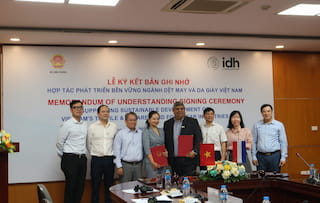Vietnam’s Textile and Footwear Industries Join Forces for Sustainable Future: MoU Signed to Drive Circular Economy and Energy Efficiency

In a collective effort to scale sustainable initiatives, the Ministry of Industry and Trade (MoIT), represented by the Department of Energy Efficiency and Sustainable Development (EESD), has joined forces with the Vietnam Textile and Apparel Association (VITAS), the Vietnam Leather, Footwear, and Handbag Association (LEFASO), the Vietnam Cotton and Spinning Association (VCOSA), and IDH to sign a Memorandum of Understanding (MoU). This collaboration, effective from 2024 to 2030, strengthens ongoing efforts to promote sustainable development within Vietnam’s textile and footwear industries by fostering resource efficiency and circular economy models.
This agreement underscores Vietnam’s commitment to fostering sustainable consumption and advancing the circular economy within one of its largest and most dynamic sectors. The MoU not only strengthens partnerships among government bodies, businesses, and international organisations but also opens new opportunities for the sustainable growth of these industries.
Vietnam’s textile and footwear industries account for approximately 16% of the country’s total export turnover, providing employment to over 3 million workers. However, rapid growth in these sectors has raised critical challenges, including the need to manage resource use, reduce energy consumption, lower greenhouse gas emissions, and minimise environmental impact. A sustainable approach is crucial for maintaining industry growth while addressing these challenges.
The MoU lays the foundation for robust collaboration among ministries, associations, businesses, and donors. With the technical support of IDH and its partners, the initiative will focus on three key areas:
- Sustainable Consumption and Production: The MoU aligns with Vietnam’s National Programme on Sustainable Production and Consumption for the 2021-2030 period. It will encourage the textile and footwear sectors to adopt sustainable practices, optimising energy and resource use while reducing waste and emissions.
- Energy Efficiency: Enterprises will receive support to implement energy-saving solutions, aiming for a minimum 10% annual reduction in energy consumption. These efforts will enhance production efficiency and minimise environmental impacts.
- Circular Economy Development: The cooperation will emphasise building circular economy models in the textile and footwear industries. This includes reusing resources, reducing waste, and lowering production costs, contributing to more efficient and sustainable manufacturing processes.
- Climate Change Adaptation and Green Growth: The MoU will assist businesses in pursuing green growth goals and adapting to climate change, contributing to national initiatives such as the Energy Efficiency and Conservation Programme (2019-2030) and Vietnam’s climate commitments.
Speaking at the event, Ms. Nguyen Thi Lam Giang – Director General of the Department of Energy Efficiency and Sustainable Development (Ministry of Industry and Trade) emphasized: “The cooperation between the Ministry of Industry and Trade with IDH, Associations, and relevant parties within the framework of today’s Memorandum of Understanding will contribute to promoting the application and replication of sustainable development models, expanding the market for environmentally friendly products, and enhancing the competitiveness of domestic Textile and Footwear enterprises, contributing to the implementation of Vietnam’s international commitments on sustainable development and climate change in the coming time.”
Mr Pramit Chanda, Global Director of the Textile and Manufacturing Programme at IDH, added, “This MoU marks an important step forward in promoting sustainable consumption and production, improving energy efficiency, and encouraging circular economic models. By combining efforts between public and private partners, we aim to create sustainable value for businesses, communities, and society.”
Mr. Truong Van Cam – Vice President and General Secretary of the Vietnam Textile and Apparel Association (VITAS) shared, “The collaboration is essential to raise awareness of businesses and workers in complying with the provisions of Vietnamese law and meeting the requirements of labor and environmental standards of import markets.”
About the Partners
The Department of Energy Efficiency and Sustainable Development (EESD) leads efforts in energy efficiency, climate change response, and sustainable development.
VITAS, LEFASO, and VCOSA are non-profit organisations representing Vietnam’s textile, footwear, and cotton-spinning industries, respectively. These associations play a vital role in promoting sustainable development and ensuring international competitiveness.
IDH brings together businesses, governments, and civil society organisations to promote sustainable trade in global value chains. IDH’s programmes foster multi-stakeholder partnerships, driving sustainable practices that benefit communities and the environment.